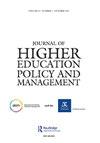Globalisation, policy transferring and indigenisation in higher education: the case of Qatar’s education city
IF 2.4
3区 教育学
Q1 EDUCATION & EDUCATIONAL RESEARCH
Journal of Higher Education Policy and Management
Pub Date : 2023-11-10
DOI:10.1080/1360080x.2023.2277478
引用次数: 0
Abstract
ABSTRACTQatar’s transition from a hydrocarbon-based to a knowledge-based economy spurred the development of Education City, which houses several International Branch Campuses and one home-grown university, Hamad bin Khalifa University. Through the case study of EC, this paper seeks to improve our understanding of higher education policy borrowing and the complex process of indigenisation. Using secondary data from prior studies, it offers a discussion on the key stages and challenges in Qatar’s effort to indigenise higher education and outlines areas for further research. This paper uses Phillips and Ochs four-stage Model of Policy Borrowing in Education, as a guiding conceptual model. The paper is constructed as follows: first, a discussion on international branch campuses in Education City; second, outlining the conceptual model; third, a discussion on Education City through the conceptual model; and finally, the case of the home-grown university, Hamad bin Khalifa University.KEYWORDS: Indigenisation of educationlocalisationinternational branch campuseshigher educationEducation policy transferring AcknowledgementsOpen Access funding provided by the Qatar National Library.Disclosure statementNo potential conflict of interest was reported by the author(s).Additional informationFundingThis work was supported by the Qatar National Library.高等教育的全球化、政策转移和本土化:以卡塔尔教育城为例
【摘要】卡塔尔从碳氢化合物经济向知识经济的转型推动了教育城的发展,其中包括几个国际分校和一所本土大学哈马德·本·哈利法大学。本文试图通过对欧共体的个案研究,提高我们对高等教育政策借鉴和复杂的本土化过程的认识。利用先前研究的二手数据,它提供了卡塔尔努力实现高等教育本土化的关键阶段和挑战的讨论,并概述了进一步研究的领域。本文采用菲利普斯和奥克斯的教育政策借用四阶段模型作为指导概念模型。本文的结构如下:首先,对教育城的国际分校进行了探讨;第二,概述概念模型;第三,通过概念模型对教育城市进行探讨;最后是本土大学哈马德·本·哈利法大学。关键词:教育本土化、国际分校、高等教育、教育政策转移致谢、卡塔尔国家图书馆开放获取资助披露声明作者未报告潜在的利益冲突。本研究得到了卡塔尔国家图书馆的支持。
本文章由计算机程序翻译,如有差异,请以英文原文为准。
求助全文
约1分钟内获得全文
求助全文
来源期刊

Journal of Higher Education Policy and Management
EDUCATION & EDUCATIONAL RESEARCH-
CiteScore
5.30
自引率
7.70%
发文量
52
期刊介绍:
The Journal of Higher Education Policy and Management is an international journal of professional experience and ideas in post-secondary education. It is a must read for those seeking to influence educational policy making. The journal also aims to be of use to managers and senior academic staff who seek to place their work and interests in a broad context and influence educational policy and practice.
 求助内容:
求助内容: 应助结果提醒方式:
应助结果提醒方式:


